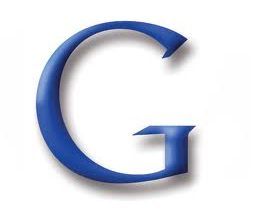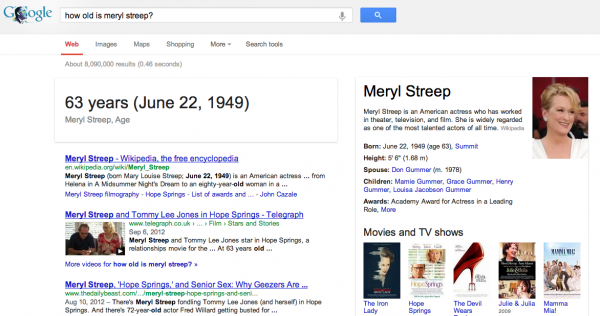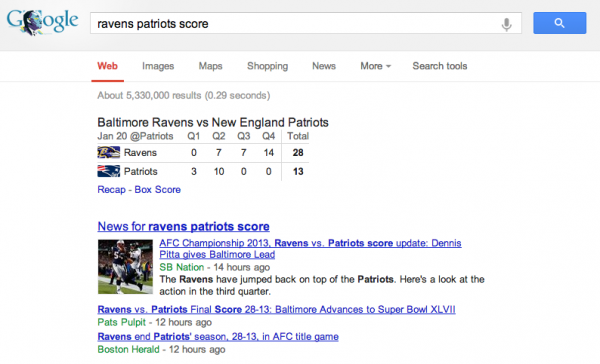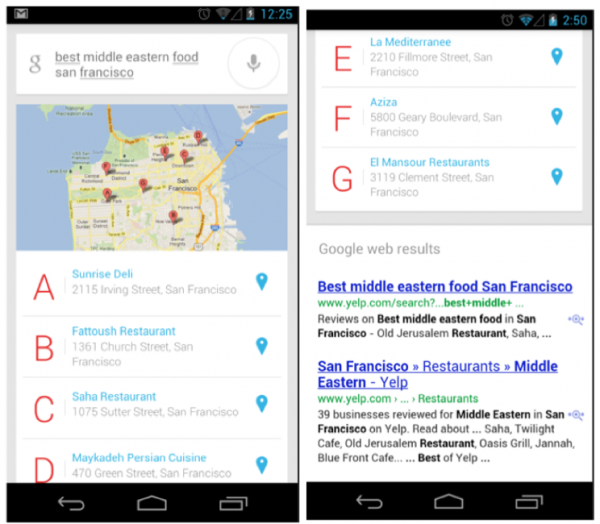As Google Evolves To Satisfy User Demands, Others Are Necessarily Marginalized
While it might not get off quite as easily in Europe, Google definitely “dodged a bullet” at the FTC, which recently concluded its antitrust investigation and didn’t ask the company to make any changes in the way it presents search results. That was a major disappointment to Google competitors, critics and other third party publishers, […]

The now-familiar lament goes: once Google was simply a way to organize and discover information, to get people from A to B. However, over the past several years Google has become a destination and content publisher, most recently expressed in its acquisitions of Zagat, Frommer’s and ITA Software. Then, of course, there’s Google Maps and related local content.
The FTC didn’t proceed with any formal action against Google on the claim of “search bias” largely because it would have been difficult, if not impossible, to show any consumer harm from Google’s conduct. Rather than harming consumers, I would argue Google is giving consumers exactly what they want.
Especially in a mobile context, people are less interested in sorting through links to websites and more interested in just getting information or “answers” to their questions. What’s the weather in Washington DC? What’s the score of the Ravens’ game? What’s the definition of perspicacious? Where in the world are the Maldives? How old is Meryl Streep?
Competitive mobile search imperatives are driving a rapid evolution of the product not only on “post PC” devices but on the PC itself. Do a local search on an Android Jelly Bean device and conventional Web links are totally buried below the map and local listings. Yet, Google is also trying to mirror the mobile search experience on the PC to some degree.
To answer queries, Google is increasingly providing more structured information “cards” (featured in Google Now) and rapidly expanding its use of the Knowledge Graph. The Guardian has a lengthy feature on the development and potential future direction of Knowledge Graph.
Google Now (including Voice Search) and Knowledge Graph are powerful initiatives guiding the evolution of the Google experience. They rely heavily upon structured information and less upon conventional web content. I would argue that this is precisely what consumers want.
In a significant number of cases consumers don’t care about the information source so long as it’s reliable. Don’t give me multiple sites teasing the definition of perspicacious. I just want the damn definition.
What’s the US dollar equivalent of 250 South African Rand? I don’t care which currency exchange site I’m using so long as it’s accurate. Better yet: just give me the answer.
If I get the answer I need from Google, I’m less likely to be interested in or click on any of the links below. In some cases, however, where I’m trying to find the best deal on a hotel or 42-inch plasma TV or the best price for a mattress, for example, I probably do want access to multiple sites for available inventory and pricing.
Yet, there are a wide variety of cases where I just want Google to tell me an answer, especially on a mobile device. I don’t want to take the time to click through to websites not optimized for mobile. If I have a “relationship” with a publisher or brand, there’s a good chance I’ll have their app on my phone: Yelp, Chase, Amazon, TripAdvisor, United Airlines, Kayak, the New York Times, Rotten Tomatoes and so on.
Accordingly, for an elite group of mostly branded publishers and content providers, I will bypass Google entirely in mobile. That’s one of the reasons Google is scrambling to add richness and utility to mobile search: to remain useful and relevant. And in those circumstances where I don’t have a preferred information provider (i.e., app) I want the fastest “answer” I can get — preferably from Google — on the first screen I see.
While publishers are angrily and somewhat arrogantly bemoaning Google’s encroachment onto their turf, I would argue this is precisely what consumers want. People no longer have patience for traditional search results except in a shrinking set of circumstances. They mostly just want quick (and reliable) answers, which is exactly what Google is increasingly giving them.
Contributing authors are invited to create content for Search Engine Land and are chosen for their expertise and contribution to the search community. Our contributors work under the oversight of the editorial staff and contributions are checked for quality and relevance to our readers. The opinions they express are their own.
Related stories
New on Search Engine Land




